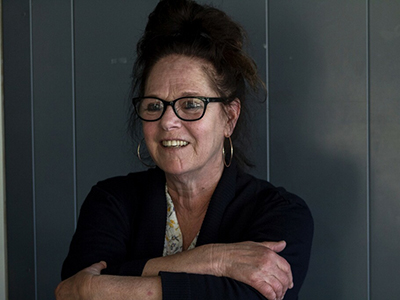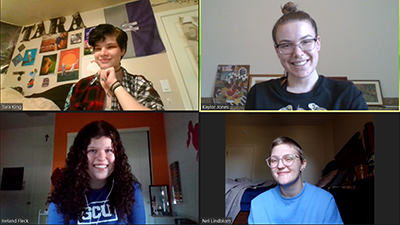
By Mike Kilen
GCU News Bureau
It was Tara King’s sophomore year, and she used her spare time to write. She loved to do it, just for herself, not for a paycheck, class assignment or audience. Then friend Nel Lindblom told her about a writing group where students shared their words.
“I think she had to actually drag me there because I was so hesitant to share,” said King, an incoming senior at Grand Canyon University. “Other than my best friend, I had never shared my writing with anybody else.”
King arrived on roller skates; it’s how she gets around campus.
Eyes turned to her that day two years ago at the Write On group at GCU. She was asked to read and, hesitantly, she began to recite her poem about the beauty and futility of a delicate spider’s web in the corner of an old barn.
“I remember my voice was trembling the entire time,” she said.
But the reaction of Write On group member Kaylor Jones was anything but shaky.
“I remember thinking, 'Roller skate girl can write!'” Jones said.
Once King’s breathing calmed, she said, she could hear positive feedback.
“And it was like, ‘Maybe this is something that I could be really good at and I could do for a long time.’ Before then, I didn’t know if I was good at it or if this was just something I like to do for catharsis. It gave me a lot more confidence in my writing.”

The power of Write On is its community, so powerful for the participants that this summer they didn’t want it to end. The optional Explore More offering, led during the fall and spring semesters by English faculty members Dr. Diane Goodman and Dr. Heather Brody, has continued weekly through the summer, led by graduates and current students.
“We always had Write On during the week to give us a kick in the pants to remind us of our poetry or fiction. I don’t know about you guys, but I didn’t want that weekly reminder to end over the summer, which is when we need it most,” Jones said in the group’s recent Zoom meeting.
Jones, who graduated in April with a degree in English with an Emphasis on Professional Writing, had first come to Write On as a freshman, unsure of what she wanted to do with her life.
“I had never written a poem before. I was floored by the passion all these people had for analyzing and reading poetry. What they were reading was so complicated and profound that within a week I had written my first poem ever,” she said.
Now Jones is a published writer, having had several poems accepted by literary and online poetry sites, including Nightingale & Sparrow, and is a regular freelance contributor to So Scottsdale magazine. She is applying for coveted spots in competitive graduate creative writing programs.
She credits Write On. Most of what she has published was either written in meetings or workshopped there.
“It’s such a communal experience. Everyone participates equally and everyone wants to be there,” Jones said. “No one is on computers sorting emails. Even the shy ones who just start out — there is no pressure to talk, but it’s so warm and open that they want to.”
Write On was conceived six years ago by Goodman, who came to GCU’s English department in 2015 with an impressive resume, including a Master of Fine Arts in creative writing and three published short story collections. She and Brody lead the group through writing exercises, discussions and workshopping student writing. Before COVID, more than two dozen students would pack a room, and last year they joined via Zoom.
“One of the things over these years that has been so unbelievable — it sends these young writers to places in their heads they didn’t know existed,” Goodman said. “They end up discovering how talented they are by writing out of their own box.”
Goodman said that Write On, student-run literary journal Startlebloom and a student writing club Friends of the Pen have created a vibrant creative writing community at GCU. It’s sort of a hidden treasure.
“They all started coming and bringing their friends,” she said.

Goodman had been through the rigors of creative writing workshops – “I cried my way through my MFA” – where fellow writers can get sharp in their critiques. She brought a humane touch to the sessions.
“I start by telling them this is a safe place,” she said. “We come out of kindness.”
She models the approach to feedback, picking out what she liked and gently asking if the writer thought maybe this word, section or character could be approached a different way.
Her example was evident in the recent Zoom meeting.
Lindblom, also a recent graduate, read a piece she wrote in response to a writing prompt, a photo of arms reaching out of the water. Her piece was a meditation by a man who walked across a dock, rotted with time, closing his eyes to remember his father lifting him through the water as a boy.
Jones told Lindblom that she loved the emotion evoked in the language and the mystery in the flashback, but she pointed out inconsistent use of both lake and ocean.
Jones shared a poem of a family moving to a faraway place, watching a girl with a tambourine in one hand and a basket of cacao pods in the other:
They eat in the afternoon at the base of the rubber tree./We memorize the music and forget the cost.
Participants provided unmuted applause over Zoom.
“You know those specific words we don’t have words for in English?” King asked Jones. “You write poems about those kinds of feelings.”
The group members say the feedback has helped them get published, or in Lindblom’s case, make the finalist list in an online Fractured Lit contest.
Write On colleagues, she said, can read the piece in a way you never thought of or help you find specific words to remove or swap.
“Everyone is here for one thing. Knowing it is completely optional, that no one is there for extra credit or because a friend dragged them along. Every single person in that room or Zoom call is there because they love spending time together and talking about our shared passion,” Lindblom said.
It has helped incoming sophomore Ireland Fleck gain confidence to write intimately.
“A lot of what I write is to get feelings out,” she said. “It’s almost like therapy.”
Soon, they find the joy of sharing it with an audience.
“They are words on a page, but you can make people feel in so many ways because of them,” Jones said. “Kind of like painting. When you are done, you are left with the moment.”
Grand Canyon University senior writer Mike Kilen can be reached at [email protected] or at 602-639-6764.
***
Related content:
GCU Today: Alum used writing to help students during pandemic



































































